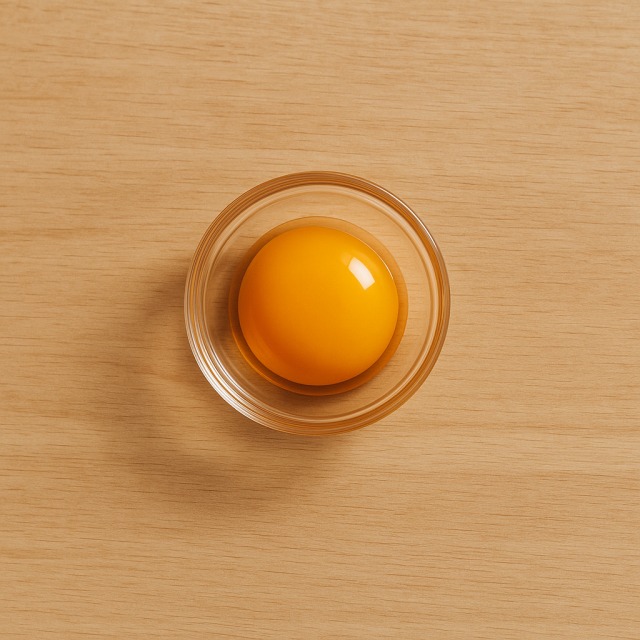Calorie Chart / Meat & Eggs / Egg
How Many Calories Are in Egg?
Calculation of the nutritional value & Recommended Dietary Intake of egg
For g and a calorie requirement of kcal
| Calories 73 kcal | Proteins 6.5 g | Lipids 5.3 g | Carbohydrates 0 g |
| 4% | 9% | 8% | 0% |
Health benefits of egg

Egg - 100g
Calories 146 kcal
Proteins 13 g
Lipids 10.5 g
Carbohydrates 0 g
With 146 calories per 100 g, the egg is classified as a moderate-calorie food: neither as light as a cucumber nor as energy-dense as butter. These calories come almost entirely from high-quality proteins and lipids, since the egg contains virtually no carbohydrates.
An egg delivers the full spectrum of essential amino acids, vitamin A for eyesight, vitamin D for bone health, vitamin E and selenium for antioxidant action, and vitamin B12 plus riboflavin for energy metabolism. The yolk is also one of the best dietary sources of choline, a nutrient involved in brain function. Minerals such as phosphorus, iron, and iodine further enhance its nutritional profile. Lutein and zeaxanthin, two carotenoids concentrated in the yolk, are thought to contribute to macular health.
Contrary to outdated beliefs, research now shows that the cholesterol in eggs has little impact on most people's blood cholesterol. Their satiating power can help reduce overall daily calories, while the proteins support muscle maintenance, a benefit prized by athletes. A fun historical note: in 1911, the first patent for a modern egg carton was filed, drastically reducing breakage and therefore saving both money and calories for households of the time.
Tips for incorporating egg into a balanced diet
To keep the calories under control, prefer cooking methods such as poaching, boiling, or steam-baking. A classic breakfast idea is two soft-boiled eggs with a slice of whole-grain wholemeal bread and a handful of spinach. The meal stays around 300 calories while offering an excellent protein–fiber balance.
If you need more calories after training, turn them into a Spanish-style tortilla with diced potato and strips of salmon. For a lighter lunch, try a Buddha bowl: one hard-boiled egg, half an avocado, 100 g of brown rice, and grilled broccoli. The mixture keeps calories moderate but provides long-lasting satiety.
Want a gourmet option without blowing up the calorie count? Replace traditional Hollandaise in eggs Benedict with a spoonful of plain yogurt mixed with lemon juice and Dijon mustard. Finally, remember that adding extra oil or cheese can double the calories of an omelet; instead, bulk it up with aromatic vegetables like bell pepper or mushroom cream.
Frequently Asked Questions
- How many calories are in an egg?
- There are 146 kcal per 100 g.
- Which part has fewer calories, the white or the yolk?
- The egg white provides roughly 45 calories per 100 g, while the egg yolk contains about 322 calories per 100 g because of its fat content.
- Are eggs suitable for a low-calorie diet?
- Yes. Their high satiety index helps you eat fewer overall calories during the day, especially when they replace refined-carbohydrate breakfasts.
- How many eggs can I eat daily without exceeding my calorie budget?
- Two medium eggs supply about 150–160 calories. Most healthy adults can include this amount daily within a 1 600-to-2 000-calorie plan, provided total dietary fat remains balanced.
- What is the best way to cook eggs to save calories?
- Poaching or boiling adds virtually zero extra calories. Frying can add 50–100 calories, depending on the amount of oil or butter.
- Do raw eggs have fewer calories than cooked eggs?
- The calorie value stays the same; cooking only changes texture and digestibility, not calories.
Similar foods
Information provided by Calorie Menu may contain inaccuracies or errors. It cannot, under any circumstances, substitute medical advice or medication.










